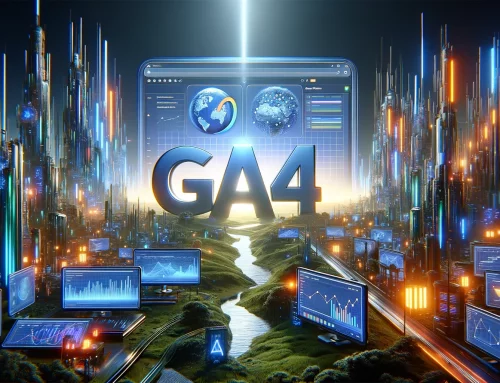Leveraging AI technologies for digital marketing
In late-2022 the marketing industry began to understand just how momentous artificial intelligence could be. Two technologies created by the research laboratory OpenAI put the incredible potential of AI on full display.
The first, released in July, was DALL-E 2, the second iteration of an AI-powered art tool that could generate truly incredible imagery from nothing more than a brief, natural language prompt. The second, released in November, was ChatGPT, the latest iteration of a large language model capable of delivering incredibly articulate, detailed answers to questions and prompts written in conversational English.
While it’s important to note that both of these technologies are still in their test phases, the speed of their improvement took many by surprise, and their potential effects on the digital marketing industry, particularly on the creative side, were immediately apparent.
But you don’t need a crystal ball to understand the effect of AI on digital marketing, because it’s already happening.
The use of machine learning and AI in marketing is more common than you might think. Early adopters are already leaning heavily on technology to both handle digital marketing busywork and enhance the effectiveness of their efforts.
How? Here are five examples of how AI can help in the development and delivery of your marketing strategy right now.
Use AI for more personalised customer segmentation
Good marketing is built on a deep understanding of who you are marketing to. Customer segmentation is the practice of splitting your target audience into more specific groups which can then be marketed to in a more customised, effective way.
Machines can crunch a huge amount of data to pick up patterns that are invisible to us humans. This makes AI-powered analytics tools incredibly valuable for customer segmentation. They are not only capable of splitting your audience into groups based on specific metrics and end goals, they are also capable of identifying entirely new groups that share distinct characteristics, which can open the door to markets that you had never considered before, or indeed didn’t know existed. And AI can do all this in a matter of moments.
AI-powered segmentation allows you to develop and present more personalised offers to customers – the sort that truly resonate with them and are therefore more likely to lead to a sale.
Imagine an outdoor store that is looking to better leverage segmentation. It uses AI to segment its audience into different groups, ranging from extreme hikers to luxe campers. The extreme hikers are offered deals on survival gear, while the luxe campers are served up discounts on comfort items like high-end coffee makers. This more personalised form of marketing is capable of delivering far more sales than a generic email blast featuring the latest catalogue.
Use AI-powered chatbots to enhance the customer experience
A high-end customer experience is one that is available whenever a customer might need it, which often extends beyond the normal nine to five. But hiring employees to man the sales and customer service desks 24/7 is an expensive exercise.
Unless those employees are bots.
Many people’s opinion of chatbots was formed when the technology was in its infancy. But as ChatGPT has shown, natural language processing has come on in leaps and bounds in recent years, and modern chatbots can be indistinguishable from their human counterparts, save for the speed of their responses.
A chatbot is an employee that you don’t have to pay, and who can work all day, every day. The most common use for chatbots is as a proxy receptionist for a business’s website, answering basic queries and directing a visitor to the right web page or to a human when it doesn’t have the answers. In terms of digital marketing, a chatbot can form an effective lead generation tool, as it can ask for a few basic details from a visitor answering their question.
Modern chatbots are even capable of making sales. A chatbot can be programmed to drive prospects down the sales pipeline by leading people to contact forms, recommending products and services based on stated needs, or offering deals and discounts when certain criteria are met.
When leveraged well, chatbots can take a huge amount of low-value work from your team’s shoulders, allowing them to focus on the high-value stuff while simultaneously enhancing levels of customer satisfaction.
Optimise your ads with artificial intelligence analytics
You may already be using AI without even knowing it, as machine learning and artificial intelligence power much of the insight generated by tools like Google Analytics and Meta Business Suite.
The best digital marketers are always looking ahead. By understanding where trends are heading, a business is well-placed to make the most of these changing conditions and outperform its competitors. And in our data-driven world, this is only possible with the help of AI, or more specifically, a predictive analytics algorithm.
These algorithms work to identify trends within historical data that hint at where things might be heading. These insights can then be used to optimise everything from Google Ads to your broader marketing strategy in a way that capitalises on the changing market conditions.
Imagine a coffee chain that uses predictive analytics to forecast what might lie ahead. It notices more people ordering oat milk and fewer ordering full cream, so begins to adjust its menu and marketing to cater to the increased interest in and demand for oat milk products.
Leverage AI to ideate and enhance your content writing
While natural language processing technologies aren’t quite at the point where they can produce a long-form blog that is ready to publish, AI is proving excellent at expediting the content creation process.
First, an AI-powered tool like Answer The Public can prove invaluable during the ideation phase, as it can generate dozens or even hundreds of content ideas that people are searching for right now, based on just a couple of keywords. The seemingly simple process of coming up with a topic to write about can prove to be a hugely frustrating and time-consuming task, so getting served an array of relevant options can be a Godsend for content creators.
Second, while AI may not be writing full blogs yet – and there’s an argument to say it shouldn’t be used that way, even if it could – it is excellent at providing a writer with an outline that they can then fill in. It generates the title and subheadings, then the writer edits this framework to their tastes and fills in the blanks.
Then there are artificially intelligent writing assistants like Grammarly designed to help a writer produce more compelling work. In this way AI isn’t about replacing the human, but enhancing the human, helping to produce better content more efficiently.
Gain instant, accurate feedback on campaign effectiveness
How well is your latest marketing campaign performing? AI-based tools have a unique ability to analyse vast amounts of data in real-time, which can be used to form a current and comprehensive view of your marketing activities. Issues can be quickly identified and resolved, and you can capitalise on opportunities that may otherwise have passed you by.
One example is in keywords. When businesses describe their products and services they often use different words to what their customers use, which can result in ineffective ad campaigns. AI tools can identify when an ad doesn’t resonate with the target audience using metrics like engagement and click-through-rate (CTR), and can suggest more compelling language.
AI tools can even automate the implementation of these strategies. You advise a tool of strategic changes, then leave it to do the otherwise time-consuming busywork.
AI isn’t the future, it’s the now
Artificial intelligence is no longer science fiction – it’s a modern marketer’s reality. The technology will only become more advanced and more important as the years roll on, so smart businesses should be looking to adopt AI tools, or work with marketers who use them, right now.
At Traction we’re committed to staying on the leading edge of marketing technology to ensure that our clients enjoy the best results possible. From SEO to market research, website design to Google Ad campaigns, we use the latest AI tech to ensure you get the greatest results.







